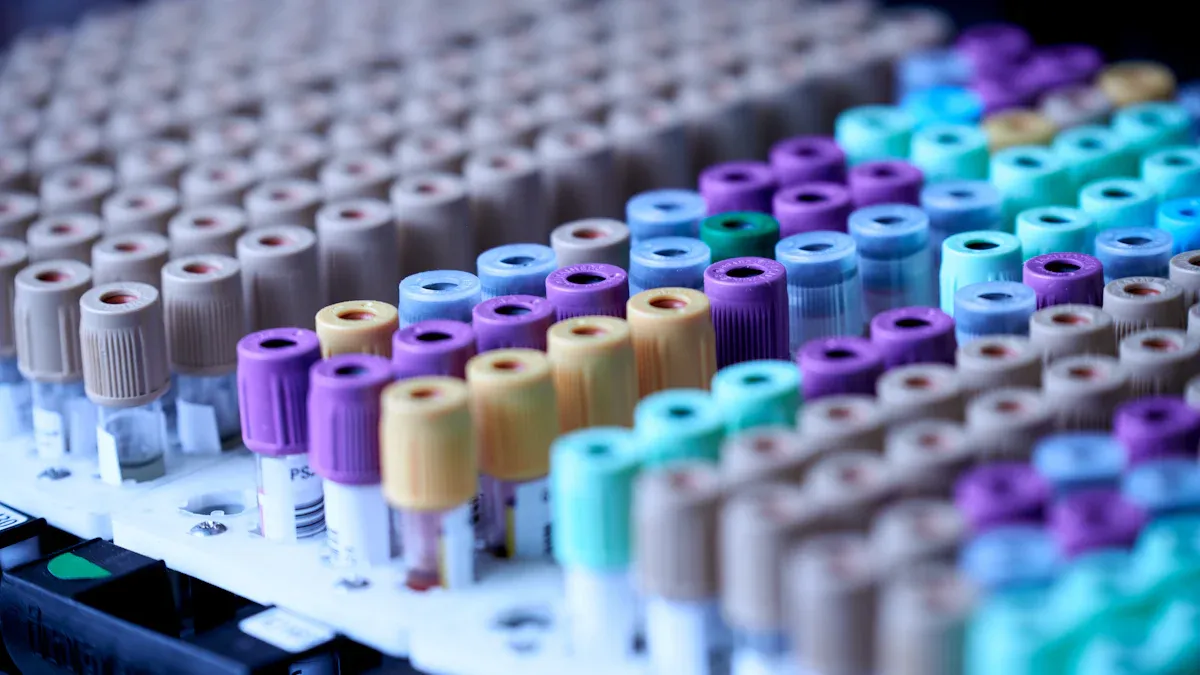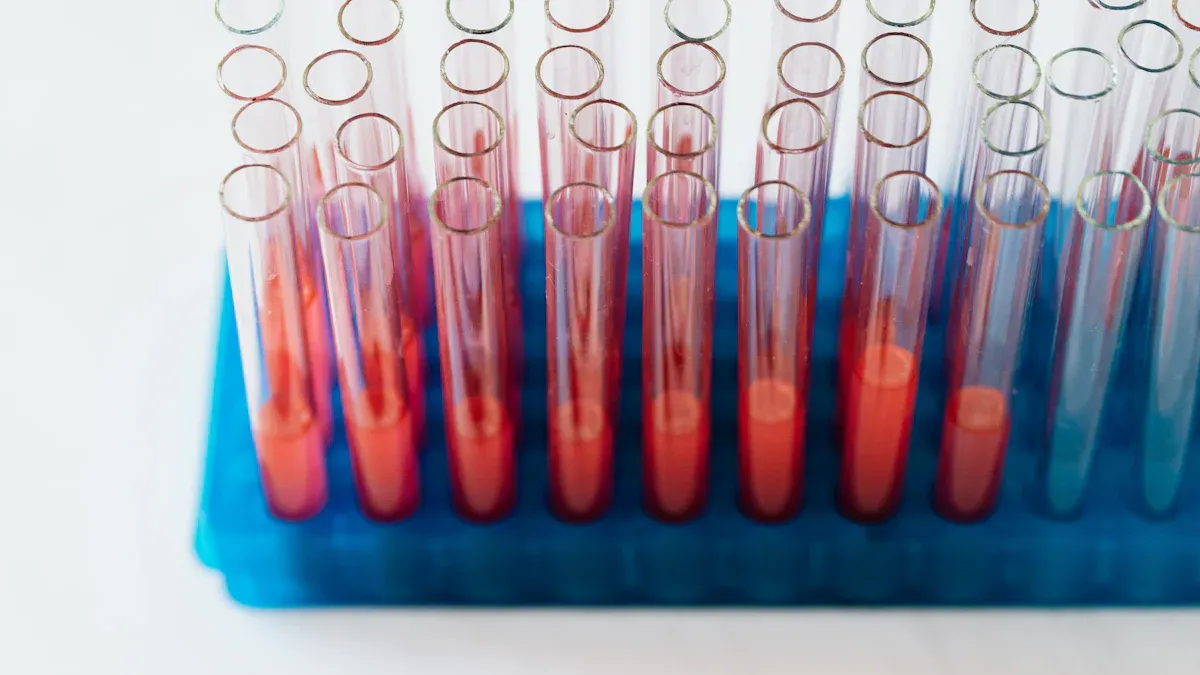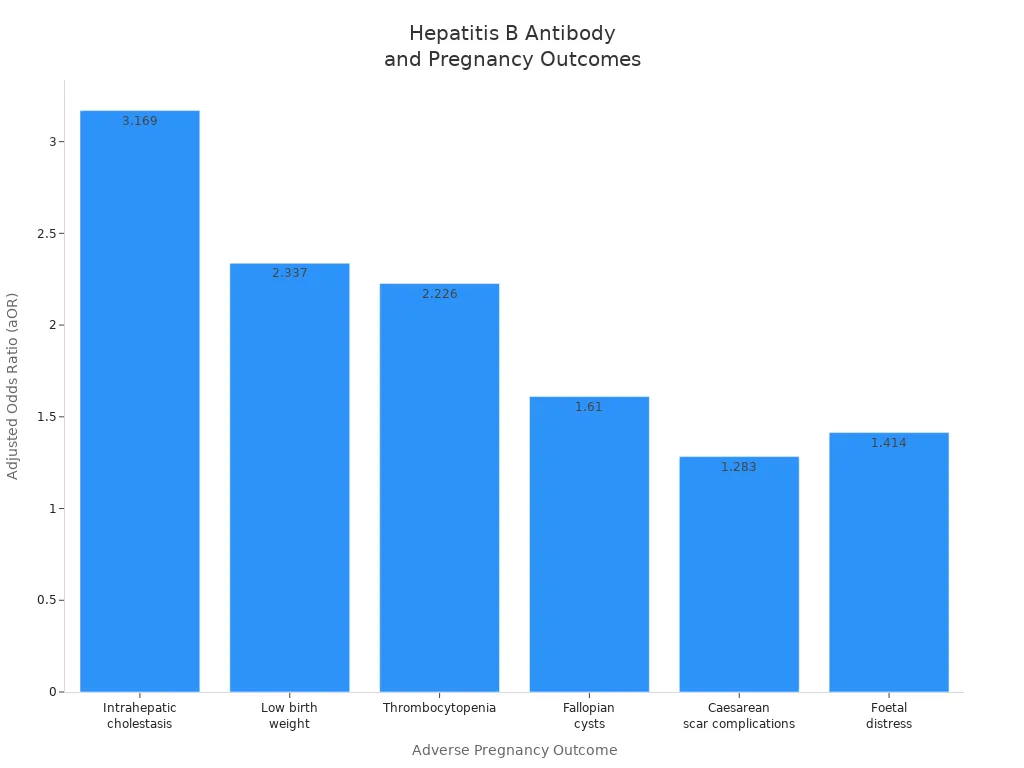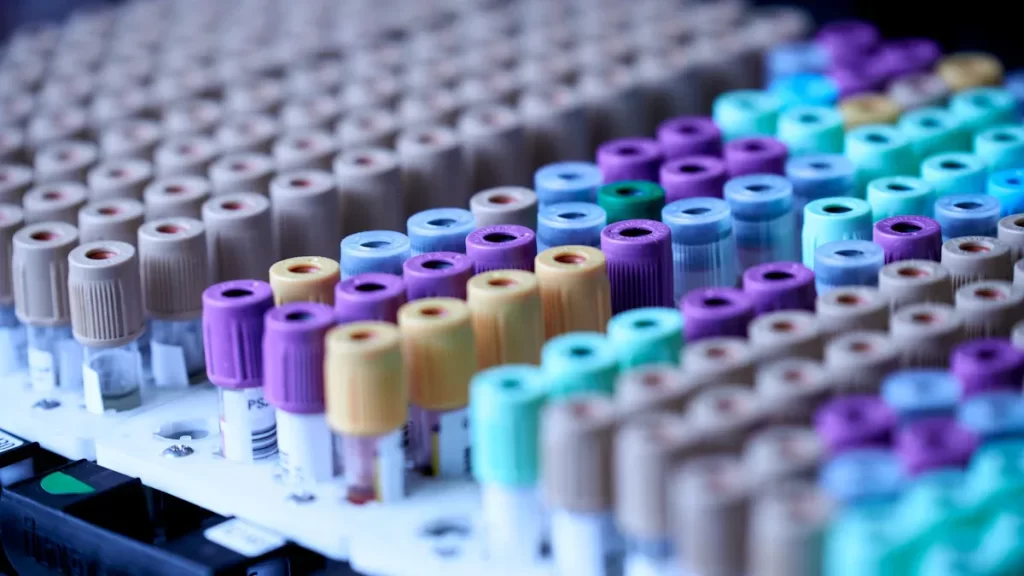News & Events
Your Guide to Hep B Surface Antibody Reactive Results in 2025

You may feel confused or worried when you see a hep b surface antibody reactive result on your blood test. This result usually means your body has responded to the hepatitis B virus or vaccine. Many people with a hep b surface antibody reactive result have developed immunity. Recent studies show that about 18.3% of people tested have protective antibodies. After vaccination, 91.5% show hep b surface antibody reactive status at one month, but this can drop to 72% after eight years. If you are between 11 and 20 years old, up to 20% may not reach the protective level. Seeing hep b surface antibody reactive on your report helps you understand your immune status and guides your next steps. You do not need medical jargon to know what hep b surface antibody reactive means for your health. This guide will help you read your hep b surface antibody reactive result and learn what to do next.
Key Takeaways
- A reactive hepatitis B surface antibody result indicates your body has developed immunity, either from vaccination or recovery from infection.
- You do not need further testing or vaccination if your anti-HBs level is 10 mIU/mL or higher after completing the vaccine series.
- Immunity from hepatitis B vaccination can last over 30 years, even if antibody levels decrease over time.
- Always consult your doctor if you have symptoms or unusual test results, especially if you have a history of hepatitis B.
- Keep track of your hepatitis B test results to monitor your health and discuss any changes with your healthcare provider.
Hep B Surface Antibody Reactive Meaning
What ‘Reactive’ Means
You see “reactive” on your hepatitis b blood test. This means your body has made hepatitis b surface antibodies. You have either recovered from hepatitis b infection or received the hepatitis b vaccine. Your immune system recognizes hepatitis b and can fight it. Doctors use the term “reactive” to show that your blood contains these protective antibodies. You do not have active hepatitis b infection if only the hepatitis b surface antibody is reactive. You do not need to worry about spreading hepatitis b to others.
Immunity and Protection
Your hepatitis b surface antibody reactive result shows you have immune protection. You can feel confident that your body can defend against hepatitis b. Scientists found that people with hepatitis b surface antibodies have a lower risk of hepatitis b reactivation. This is true for patients who had hepatitis b in the past and now have resolved infection. The table below shows how hepatitis b surface antibodies help protect you:
| Finding | Description |
|---|---|
| Anti-HBs Presence | Associated with decreased risk of HBV reactivation in patients with resolved HBV infection. |
| Patient Group | Patients undergoing chemotherapy for hematological malignancies. |
| Implication | Supports the role of anti-HBs in immunity against HBV infection and suggests its inclusion in screening protocols. |
You may wonder how long your immunity lasts. Studies show that protection from hepatitis b vaccination can last at least 32 years. Even if your hepatitis b surface antibody levels drop, your body still remembers how to fight hepatitis b. You keep long-lasting cellular immunity. Here are some facts about how long immunity lasts:
- Long-lasting cellular immunity exists even when hepatitis b surface antibody levels decrease.
- Protection from hepatitis b vaccination can last at least 32 years, even if anti-HBs levels fall below the protective threshold.
You do not need to get tested every year if you have a hepatitis b surface antibody reactive result and no other risk factors.
When No Further Action Is Needed
You may ask if you need more tests or shots after seeing a hepatitis b surface antibody reactive result. Medical guidelines help doctors decide when you need no further action. If your hepatitis b surface antibody level is 10 mIU per mL or higher after finishing the vaccine series, you do not need more tests or vaccines. The table below shows when you can stop worrying:
| Status of patient | Postexposure test results | Postvaccination serologic testing needed? |
|---|---|---|
| Documented responder: anti-HBs ≥ 10 mIU per mL after complete vaccine series (≥ three doses) | No action needed | No |
| Any result | ≥ 10 mIU per mL | No |
You do not need to repeat the hepatitis b vaccine if you meet these criteria. You do not need extra blood tests for hepatitis b surface antigens or hepatitis b core antibodies unless your doctor finds a special reason. You can feel safe knowing you have immune protection against hepatitis b.
Hepatitis B Blood Tests Overview

Key Tests and Markers
You may wonder which hepatitis b blood tests your doctor uses to check your status. These tests look for different markers in your blood. Each marker tells you something important about your hepatitis b history or current infection. Here is a table that explains the most common markers and what they mean:
| Marker | Description | Diagnostic Significance |
|---|---|---|
| HBsAg | Hepatitis B surface antigen, a protein on the virus surface. | Shows active hepatitis b infection, either acute or chronic. |
| Anti-HBs | Hepatitis B surface antibody produced in response to HBsAg. | Sign of recovery from infection or a good response to the vaccine. |
| IgG anti-HBc | Hepatitis B core antibody, present after infection. | Shows past infection but does not tell if it is current or resolved. |
| IgM HBcAb | Antibody produced during acute infection. | Positive test means recent or acute hepatitis b infection. |
Doctors use these hepatitis b blood tests to find out if you have an active infection, if you are immune, or if you had hepatitis b in the past. You may also see other markers, such as HBeAg and anti-HBe, which help show how infectious you are or if you are getting better.
Tip: If you see “anti-HBs” on your report, this is the same as hepatitis b surface antibody. It shows your immune response.
How the Tests Work
Modern hepatitis b blood tests use advanced technology to give you fast and accurate results. Most testing happens in laboratories using automated machines. These machines use enzyme immunoassays, chemiluminescence, or color changes to detect hepatitis b antigens and antibodies. Some tests, like rapid diagnostic tests, give results in minutes. Others, like laboratory-based immunoassays, provide more detailed information.
Here are some common types of hepatitis b virus testing:
- Rapid diagnostic tests (RDTs)
- Laboratory-based immunoassays, such as enzyme immunoassays (EIAs), chemiluminescence immunoassays (CLIAs), and electrochemiluminescence immunoassays
You may also hear about quantitative HBsAg tests. These help doctors tell if you are an inactive carrier or if you need more treatment. For people with chronic hepatitis b, doctors sometimes use HBV DNA tests to measure the amount of virus in your blood.
The table below shows how different hepatitis b blood tests compare in accuracy:
| Test Type | Description | Accuracy Rate |
|---|---|---|
| HBsAg | Hepatitis B surface antigen | High |
| anti-HBs | Antibody to hepatitis B surface antigen | Moderate |
| anti-HBc | Antibody to hepatitis B core antigen | Moderate |
Laboratories use several assay types. For example, the ICT-CLEIA test has ultra-high sensitivity and can detect very low levels of hepatitis b surface antigen. This helps doctors catch infections early.
Note: Automated enzyme immunoassays and PCR tests are now standard for hepatitis b virus testing. These methods help ensure you get reliable results.
Interpreting Test Results
Result Combinations
When you look at your hepatitis B blood test result, you may see several markers. Each marker tells you something different about your hepatitis B status. You need to look at all the test results together to understand what they mean for your health. Here is a table that shows the most common combinations of hepatitis B test results and what they mean:
| HBsAg (Surface Antigen) | Total anti-HBc (Core Antibody) | IgM anti-HBc | Anti-HBs (Surface Antibody) | HBV DNA | Interpretation |
|---|---|---|---|---|---|
| Negative | Negative | Negative | Negative | Negative | Never infected; susceptible |
| Positive | Negative | Negative | Negative | Positive or Negative | Early acute infection or very recent vaccination |
| Positive | Positive | Positive | Negative | Positive | Acute infection |
| Negative | Positive | Positive | Positive or Negative | Positive or Negative | Acute resolving infection |
| Negative | Positive | Negative | Positive | Negative | Recovered from past infection and immune |
| Positive | Positive | Negative | Negative | Positive | Chronic infection |
| Negative | Positive | Negative | Negative | Positive or Negative | Isolated core antibody: could mean false-positive, past infection, or rarely, low-level chronic infection |
| Negative | Negative | Negative | Positive | Negative | Immune after vaccination (if anti-HBs ≥10 mIU/mL) or recent immune globulin |
You may notice the words positive and negative appear often in your test results. Positive means the marker is present in your blood. Negative means the marker is not found. If you see a positive hepatitis B surface antibody (anti-HBs), you likely have some level of immunity. If you see a positive hepatitis B surface antigen (HBsAg), you may have an active infection.
Tip: Always check more than one marker. One positive or negative result does not tell the whole story.
Understanding Your Status
You may wonder what your hepatitis B blood test result means for your health. Interpreting test results can feel confusing, but you can use the table above to help. Here are some common situations and what they mean:
- If you have a negative HBsAg, negative anti-HBc, and negative anti-HBs, you have never had hepatitis B and are not immune. You are susceptible to infection.
- If you have a positive HBsAg, you have an active hepatitis B infection. You should talk to your doctor right away.
- If you have a positive anti-HBs and negative HBsAg, you are immune. This can happen after vaccination or recovery from infection.
- If you have a positive anti-HBc and positive anti-HBs, but negative HBsAg, you recovered from a past infection and now have immunity.
- If you have a positive anti-HBc and negative anti-HBs, you may have had a past infection, or the result could be a false-positive. Your doctor may order more testing.
You should know that a reactive hepatitis B surface antibody result usually means you have immunity. However, you need to look at other markers to get the full picture. For example, if you only have a positive anti-HBs after completing the vaccine series, you are considered immune. If you have both positive anti-HBc and positive anti-HBs, you likely recovered from a natural infection.
Healthcare providers use several markers to interpret your hepatitis B status:
| Marker | What It Means |
|---|---|
| HBsAb (anti-HBs) | Shows recovery from infection or immunity after vaccination |
| HBsAg | Shows active infection |
| HBcAb (anti-HBc) | Shows past or ongoing infection |
| HBeAg | Shows high levels of virus in your blood |
You may also want to know how strong your immunity is. Studies show that about 9.5% of people with a reactive hepatitis B surface antibody result have complete immunity. About 26.4% have partial immunity. If your anti-HBs level is 10 mIU/mL or higher, you have protective immunity.
Note: Interpreting test results helps you understand your hepatitis B status and what steps you need to take next. Always talk to your doctor if you have questions about your blood test result.
Next Steps After a Reactive Result
When to See a Doctor
You may feel relieved when your hepatitis b titer panel shows a reactive result for the surface antibody. You usually do not need to see a doctor if you have no symptoms and your hepatitis b status is clear. If you have a history of acute hepatitis b infection or chronic hepatitis, you should talk to your healthcare provider. You need to see a doctor if you have symptoms like fatigue, jaundice, or abdominal pain. These signs may point to acute or chronic hepatitis b infection. You should also visit your doctor if your hepatitis b titer panel shows unusual results or if you have risk factors for hepatitis b infection.
Tip: Always bring your hepatitis b titer panel results to your appointment. Your doctor can help you understand your hepatitis b status and decide if you need more testing.
Vaccination Guidance
You may wonder if you need hepatitis b vaccination after a reactive hepatitis b titer panel. If your anti-HBs level is above 10 mIU/mL, you do not need another vaccine. If your hepatitis b titer panel shows you are not immune, you should get vaccinated. The table below shows what to do based on your hepatitis b titer panel results:
| Hepatitis B Titer Panel Results | Next Steps |
|---|---|
| Anti-HBs ≥ 10 mIU/mL | No further vaccination needed |
| Anti-HBs < 10 mIU/mL | Hepatitis b vaccination recommended |
| HBsAg positive | See a doctor for acute or chronic infection |
You should get hepatitis b vaccination if you belong to any of these groups:
- All infants
- All children and adolescents under 19 years who have not received the vaccine
- Sexually active people
- People exposed to blood
- People living with HIV
- Individuals with chronic liver disease or hepatitis C
- Those who are incarcerated
- Anyone who wants protection against hepatitis b
You need to check your hepatitis b titer panel regularly if you are at risk for acute or chronic hepatitis b infection.
Special Situations
You may face special situations that affect your next steps. If you have chronic hepatitis or a history of acute hepatitis b infection, you need regular hepatitis b titer panel testing. Pregnant women should ask their doctor about hepatitis b titer panel results and hepatitis b vaccination. If you have a weak immune system, you may need extra hepatitis b vaccination or more frequent hepatitis b titer panel testing. People with chronic liver disease or hepatitis C need to monitor their hepatitis b status closely.
Note: Your doctor can help you decide the best next steps based on your hepatitis b titer panel results and your health history.
Hepatitis and Special Considerations
Immunity After Infection or Vaccination
You may wonder how your immunity changes depending on how you got hepatitis b surface antibodies. If you recovered from a natural hepatitis b infection, your immune response is usually stronger and lasts longer. Vaccination also gives you protection, but the strength of your immunity may decrease over time. The table below shows the differences between natural infection and vaccination:
| Aspect | Natural Infection | Vaccination |
|---|---|---|
| Immune Response | More robust and lasting | May decline over time |
| Antibody Positivity Rate | Higher in older individuals | Lower in adults compared to children |
| Immunogenicity | More effective in children | Less effective in adults |
| Immune Memory | Can persist even with undetectable HBsAb | May not persist as effectively |
You can see that children respond better to both infection and vaccination. Recent studies show that 88.89% of vaccinated children keep protective antibodies for a long time. Health workers and drug addicts also show long-term immunity, but at lower rates. The table below highlights these results:
| Group | Percentage with Anti-HBs >10 IU/L | Immunity Duration |
|---|---|---|
| Vaccinated Children | 88.89% | Long-term |
| Health Workers | 79.41% | Long-term |
| Drug Addicts | 64.28% | Long-term |
Immunocompromised Individuals
If you have a weak immune system, you need to pay special attention to your hepatitis b test results. Immunocompromised people face a higher risk of hepatitis b reactivation, especially if they receive treatments that suppress the immune system. Doctors recommend screening before starting these therapies. If you have a reactive hepatitis b surface antibody result and need B-cell depleting therapy, you should start antiviral medicine before treatment and continue it after stopping therapy.
Individuals who are HBsAg negative and hepatitis B core antibody (anti-HBc) positive have evidence of past exposure to HBV. Hepatitis B virus DNA should be checked in these individuals to exclude occult infection. Hepatitis B infection results in the presence of covalently closed circular DNA (cccDNA) in hepatocytes, regardless of whether either HBsAg or HBV DNA are detectable. cccDNA acts as a transcriptional template and can persist indefinitely; it is the formation of this minichromosome that is central to HBV reactivation (HBVr).
Although the risk of reactivation is lower in HBsAg-negative and anti-HBc-positive persons when compared to HBsAg-positive and anti-HBc-positive individuals, these patients remain at significant risk for HBV reactivation, particularly with the use of high-risk immunosuppressive drugs, such as B-cell depleting agents.
In these settings, rates of reactivation up to 40% have been described among persons who are HBsAg-negative and anti-HBc-positive.
Pregnancy and Hepatitis
If you are pregnant, you need to follow special steps to protect yourself and your baby from hepatitis b. Doctors recommend screening all pregnant patients for hepatitis b at the first prenatal visit. You should get both HBsAg and surface antibody tests. If both results are negative, you may need the hepatitis b vaccine series, especially if you are at high risk. If your HBsAg test is positive, your doctor will check your HBV DNA, HBeAg, and ALT levels. Sexual contacts and household members should also get screened.
| Step | Recommendation |
|---|---|
| 1 | Screen all pregnant patients for HBV at the earliest prenatal visit. |
| 2 | Measure HBsAg and surface antibody levels. |
| 3 | If both tests are negative, administer HBV vaccination series to high-risk individuals. |
| 4 | If HBsAg is positive, confirm with HBV DNA measurement and assess HBeAg status and ALT levels. |
| 5 | Screen sexual contacts and household members of HBsAg-positive women. |
| 6 | Refer to a specialist if viral load >20,000 IU/mL, ALT >19 IU/mL, or HBeAg positive. |
| 7 | Consider antiviral therapy at week 32 if viral load >1 million copies. |
| 8 | Administer HBV vaccination series and HBIG to all infants within 12 hours of birth. |
If you test positive for HBsAg, your doctor will take steps to prevent passing hepatitis b to your baby. All infants born to mothers with hepatitis b should get the vaccine and HBIG within 12 hours. Doctors will complete the vaccine series and test the baby at 9-12 months.
Some studies show that hepatitis b surface antibody reactivity can affect pregnancy outcomes. You may face higher risks for certain problems, such as low birth weight or foetal distress. The table below shows the odds for these outcomes:
| Adverse Pregnancy Outcome | Adjusted Odds Ratio (aOR) |
|---|---|
| Intrahepatic cholestasis of pregnancy | 3.169 |
| Low birth weight | 2.337 |
| Thrombocytopenia | 2.226 |
| Fallopian cysts | 1.610 |
| Caesarean scar complications | 1.283 |
| Foetal distress | 1.414 |

Talking to Your Healthcare Provider

Questions to Ask
You may feel unsure about what to discuss with your doctor after receiving your hepatitis B blood test results. Asking clear questions helps you understand your hepatitis b status and guides your next steps. Here are some practical questions you can bring to your appointment:
- What does my hepatitis B surface antibody reactive result mean for my health?
- Do I need any more tests to confirm my hepatitis B status?
- Should I get vaccinated or receive a booster shot?
- How often should I check my hepatitis B status?
- Are there any risks I should know about based on my test results?
- What do my other hepatitis B markers show?
- Do I need to take any special precautions at home or work?
Tip: Write your questions down before your visit. This helps you remember what to ask and makes your appointment more productive.
Tracking Your Hepatitis B Status
Keeping a record of your hepatitis B blood tests helps you and your doctor monitor your health over time. You can use simple tools to track your results. Many people use a notebook, a phone app, or a spreadsheet. Recording the date, type of test, and result gives you a clear picture of your hepatitis b status.
You can also use new methods to make tracking easier:
- Dried blood spot (DBS) testing allows you to collect samples painlessly at home. You do not need special training. DBS is cost-effective and works for both screening and confirmatory tests.
- Quantitative HBsAg testing helps you and your doctor see changes in your hepatitis B status. This test shows how your infection responds to treatment.
Note: Bring your records to every appointment. Your doctor can use your history to give better advice and spot changes early.
Tracking your hepatitis B status helps you stay informed and take control of your health. You can share your records with your healthcare provider and make decisions together.
You now know that a hepatitis B surface antibody reactive result means your body has built protection. You can use your results to understand your immunity and decide if you need more care. The table below shows how knowing your antibody status can help lower health risks:
| Status and Inflammation | Mortality Risk |
|---|---|
| HBV Antibody-Positive | Lower |
| HBV Antibody-Negative with High SII | Highest |
| HBV Antibody-Positive with High SII | Moderately Lower |
You should talk with your healthcare provider about your results. Taking charge of your hepatitis status helps you stay healthy for years.
FAQ
What does a “hep B surface antibody reactive” result mean?
You have developed antibodies against hepatitis B. This usually means you are immune to the virus. You either received the hepatitis B vaccine or recovered from a past infection. You do not have an active infection.
Do I need a booster shot if my result is reactive?
Most people do not need a booster shot if their anti-HBs level is 10 mIU/mL or higher. Studies show that protection can last over 30 years, even if antibody levels drop.
Can I still get hepatitis B if my antibody is reactive?
You have strong protection against hepatitis B. Rarely, people with weak immune systems may lose protection. If you have health concerns, ask your doctor for advice.
Should my family members get tested or vaccinated?
Yes, your family members should get tested if they have not received the hepatitis B vaccine. Vaccination protects them from infection. Doctors recommend testing and vaccination for all household contacts of someone with hepatitis B.
How often should I check my hepatitis B status?
Most people do not need regular testing after showing immunity. If you have a weak immune system or certain health risks, your doctor may suggest more frequent checks.

